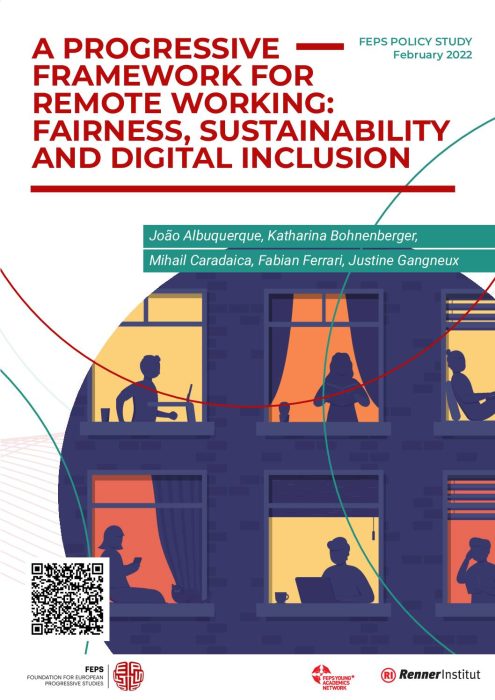Post Doctoral Researcher University of Glasgow
Justine works as a post-doctoral researcher at the Urban Big Data Centre at the University of Glasgow. Her current research focuses on the materialisation of the ‘smart city’ and the ways in which citizens interact with data and digital infrastructures in urban spaces, as well as on the collection, use and governance of data in local contexts. Her research interests sit at the intersection of digital sociology, critical data studies, governance and urban studies.
A Progressive Framework for Remote Working: Fairness, Sustainability and Digital Inclusion
The European Investment Bank (EIB) is the EU’s multilateral development bank. In this FEPS YAN policy study, the authors suggest four reforms that would help progressive policymakers to utilize unlock the EIB’s potential to play a greater role in the EU economy and its transition to a more resilient, climate-neutral, and progressive economy.
First, the authors suggest the EIB adopts more comprehensive lending targets based on social and environmental criteria. Second, they highlight the need for a stronger focus on equity-like instruments rather than debt instruments, especially in the ongoing response to the Covid-19 crisis. Third, they propose to strengthen the EIB’s accountability towards the European Parliament to ensure a legitimate political direction and democratic control of its activities. Fourth, they propose to convert the EIB’s retained profits into paid-in capital, unlocking up to €110 billion of additional lending capacity. To simultaneously accomplish increased democratic accountability, the authors suggest converting the EIB’s retained profits into EU capital and thus making the EU an EIB shareholder.
Read the paper:
How to unlock the European Investment Bank’s potential: four reforms
Political Mentor: EP Vice President and S&D MEP Pedro Silva Pereira
Academic Mentor: Carlo d' Ippoliti, Associate professor of political economy at the Department of Statistical Sciences of Sapienza University of Rome.
PhD candidate Kingston University London
This policy brief is an attempt to sketch out the baselines of a new progressive approach towards remote work. An approach that fosters social justice. An approach that takes seriously the promises and perils of digital transformation. Crucially, an approach that is compatible with ecological boundaries. In other words, the fact that proximity does not seem to play as big a role in shaping our world of work as it used to play does not have to go hand in hand with the erosion of workers’ rights. It does not have to exacerbate the worst excesses of digital capitalism. And it does not have to compound the destruction of the planet. These drawbacks are outcomes of political choices – not of natural laws. They are not inevitable.
Across three strategic levels, the policy proposals illustrate that progressives all across Europe have powerful strategies and tools at their disposal to prevent these outcomes: information; institutions; and labour law.
Read the paper:
A Progressive Framework for Remote Working: Fairness, Sustainability and Digital Inclusion
Political Mentor: S&D MEP Brando Benifei
Academic Mentor: Stewart Wood (Lord Wood of Anfield), Chair of the United Nations Association – UK
